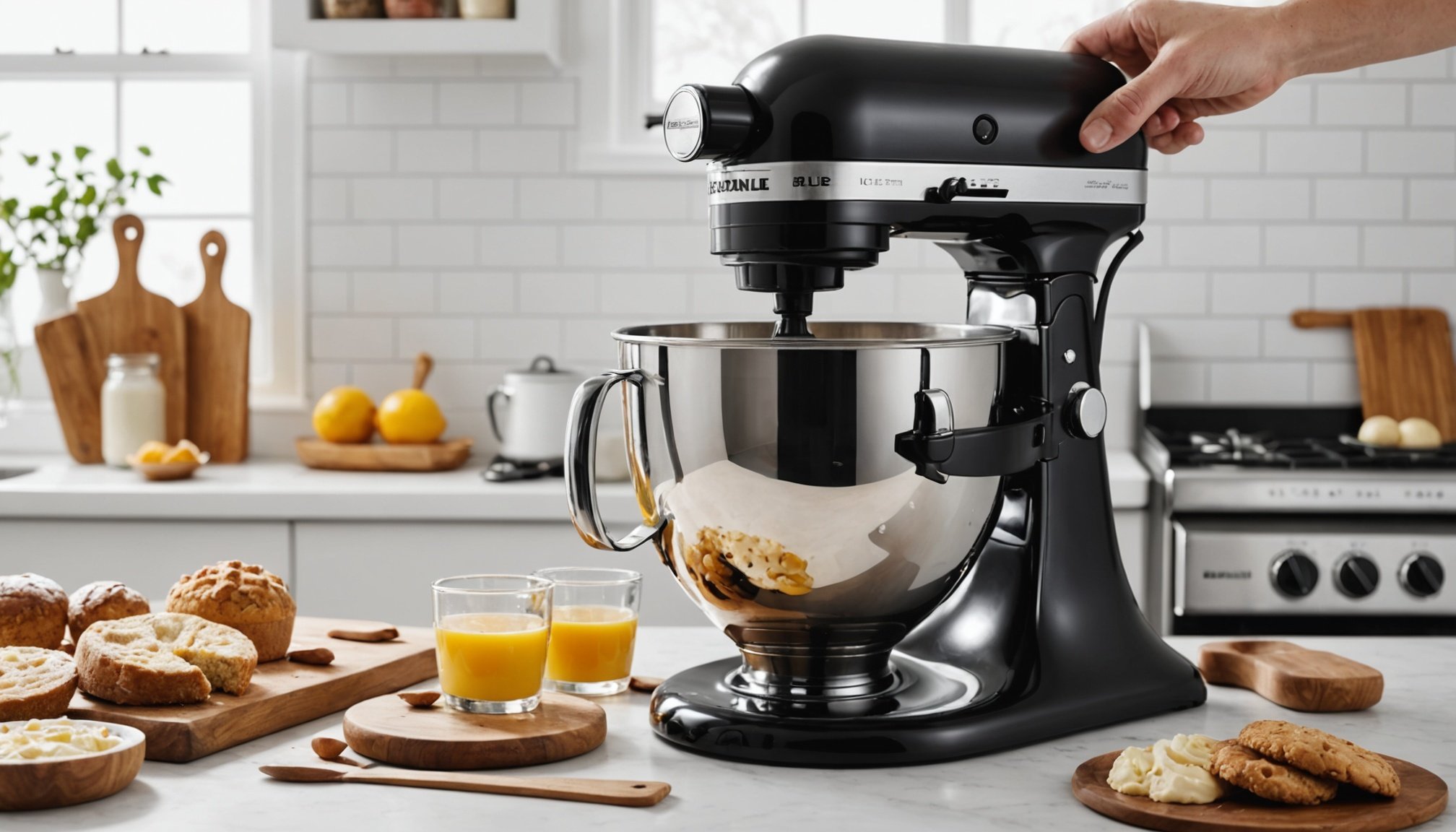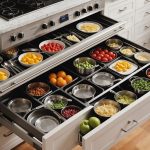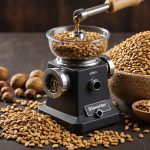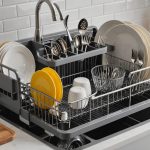Overview of Kitchen Mixers
In the bustling world of UK baking appliances, kitchen mixers are indispensable. A quality kitchen mixer elevates the baking experience, offering not only consistency but also efficiency. Whether you’re crafting a delicate meringue or kneading dough for artisan bread, these tools are crucial.
Types of Kitchen Mixers in the UK
Baking mixers come in various forms, each tailored to different baking needs. Stand mixers are popular for handling heavy-duty tasks with ease. Hand mixers, meanwhile, offer flexibility and are perfect for lighter tasks or those with limited kitchen space. Other specialty mixers, such as spiral mixers, cater to more specific baking activities and are favoured by professionals.
This might interest you : The ultimate guide to selecting ideal kitchen flooring for your uk coastal home
Key Features to Consider
When selecting from UK’s range of baking appliances, certain features demand attention:
- Motor Power: Determines the mixer’s ability to handle tough ingredients.
- Speed Settings: A variety of speeds allows greater control over your baking process.
- Bowl Capacity and material (usually stainless steel or glass) influence how much you can mix in one go.
- Attachments and Accessories expand the mixer’s versatility, allowing it to perform multiple tasks, from whisking to grinding.
Choosing the right kitchen mixer involves assessing these features in line with your baking needs.
Also read : Ultimate guide to compact drawer organizers for uk kitchens: optimize your storage space!
Essential Features to Look For
When navigating the world of mixer features, several elements stand out that impact the overall experience of using baking mixers. Motor power and speed settings are crucial. A strong motor ensures your mixer can handle dense dough or hefty mixtures with ease, while variable speed settings offer the precision needed for different baking stages.
The bowl capacity and material are also key considerations. Stainless steel is durable and easy to clean, making it a popular choice among frequent bakers. In terms of size, selecting a bowl that aligns with your baking volume is important, especially if you regularly prepare large batches.
Additionally, the value of attachments and accessories cannot be overstated. These extras significantly enhance the mixer’s versatility. From dough hooks to whisking attachments, these tools expand a mixer’s functionality, allowing it to tackle tasks beyond the basics. For instance, some models include grinding or shredding attachments, transforming your mixer into a multi-functional kitchen aid.
Selecting a mixer with the right blend of these kitchen appliance features ensures it meets your baking needs efficiently and effectively, supporting a seamless baking journey.
Top Kitchen Mixer Recommendations
When exploring the best kitchen mixers, it is essential to consider various types to suit different baking styles and needs. For stand mixers, these robust machines are perfect for avid bakers who frequently tackle heavy-duty projects. Their primary advantage lies in their power and versatility, with many models featuring an array of attachments. However, their bulkier design and higher price point can be a drawback. Among the recommended mixers for baking are the Kenwood Chef XL and KitchenAid Artisan, known for their reliability and performance, with prices typically ranging from £300 to over £500.
Hand mixers shine for casual bakers or those with limited kitchen space. Lightweight and easy to store, they offer enough capability for most everyday tasks. Top hand mixers available in the UK include the Breville Hand Mixer and the Bosch CleverMixx, offering excellent features at a more budget-friendly price between £30 and £70.
For more specialized needs, specialty mixers, like spiral or planetary mixers, cater to specific tasks such as artisan bread making. These are ideal for dedicated chefs, with prices varying considerably based on complexity and features. Ultimately, choosing a mixer depends on specific baking requirements and preferences.
Buyer’s Guide: Choosing the Right Mixer
Selecting the ideal kitchen mixer is a crucial step in enhancing your baking endeavors. Depending on your baking needs and frequency, the right choice will differ. Consider how often you bake and the types of recipes you regularly prepare. For avid bakers tackling complex tasks, a powerful stand mixer with a robust motor and various attachments is ideal. On the other hand, casual bakers or those with space constraints might prefer compact hand mixers.
Budget considerations are paramount and require careful evaluation. Set a budget baseline to help filter options, keeping in mind that higher pricing often corresponds with greater durability and feature variety. Mixer selection tips emphasize balancing affordability with features such as durability and versatility.
Reliability plays a pivotal role, so evaluate brand reliability and warranty options. Look for brands known for producing trustworthy appliances, as a strong warranty offers peace of mind, ensuring longevity and protecting your investment against potential defects. For instance, leading brands commonly provide warranties of at least one year, with extended options available.
By aligning your choices with these factors, you stand to enhance your baking experience and ensure your appliance purchasing advice corresponds with your culinary adventures.
Maintenance and Care for Kitchen Mixers
Ensuring the longevity of your kitchen mixers requires consistent maintenance and care practices. Proper upkeep not only preserves the appliance’s performance but also extends its lifespan. Regular cleaning is vital; after each use, detach and wash any removable parts with warm soapy water, ensuring all batter or dough remnants are removed. Always unplug the mixer before cleaning to prevent electrical hazards.
For routine maintenance, inspect the cord and attachments for wear and tear. Damaged cords can pose safety risks and should be replaced promptly. Lubricate moving parts if specified in the user manual to prevent mechanical issues. If your mixer exhibits unusual noises or performance dips, refer to troubleshooting guides or consult professional repair services.
Store your mixer in a cool, dry place, away from moisture to prevent rust or mould. Keeping it covered also protects it from dust accumulation, vital for maintaining its efficiency.
In summary, diligent cleaning, regular inspections, and strategic storage significantly enhance your mixer’s lifespan. These proactive steps ensure your beloved baking tool remains a reliable partner in crafting delightful baked goods for years to come.
User Testimonials and Reviews
In evaluating kitchen mixer reviews, user feedback proves invaluable in determining the best models. Consumers often highlight key aspects that influence purchasing decisions, such as motor power, durability, and ease of use.
Product ratings across various platforms showcase the standout features of popular mixers. For instance, the KitchenAid Artisan consistently garners high praise for its reliable performance and versatility, with users emphasising its robust build and efficient operation. Similarly, the Kenwood Chef XL stands out for its powerful motor, appreciated by users for handling dense mixtures effortlessly.
User experiences also shed light on potential drawbacks. While stand mixers are lauded for their capabilities, some users find them bulky and cumbersome in smaller kitchens. Alternatively, hand mixers receive accolades for their convenience and space-saving attributes, though they might lack the power needed for more demanding tasks.
Ultimately, highlighting top-rated models based on user satisfaction allows prospective buyers to make informed decisions. By considering both positive and critical reviews, one can navigate the market more effectively, ensuring that their choice of mixer aligns with personal needs and preferences.
Conclusion
Selecting the perfect kitchen mixer hinges on understanding your unique baking style. A number of factors influence this decision, like the mixer’s power, durability, and its capacity to handle various baking tasks efficiently. In the UK, options range from robust stand mixers to versatile hand mixers, catering to both professional and casual bakers.
Recapping the Key Considerations: It’s vital to keep in mind the type of mixer that aligns with your baking frequency and space availability. Stand mixers suit those with greater baking demands, while hand mixers are ideal for limited kitchen spaces or smaller tasks. Specialty mixers, like spiral models, cater specifically to artisanal baking.
Encouragement to Choose Accordingly: Think of what you bake most often and select the mixer that offers the right balance of features, accessories, and price. Listen to user testimonials and consider product ratings in your research, as these reviews provide real-world insights into a mixer’s functionality.
Final Tips for Success: Always prioritize reliability by opting for trusted brands, and balance your budget with a blend of practicality and desired features. By aligning your choices with personal needs, you’ll ensure baking success for many recipes to come.











